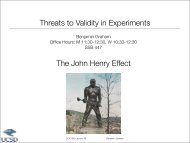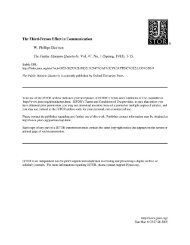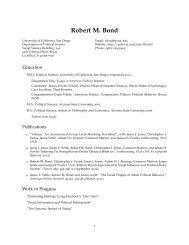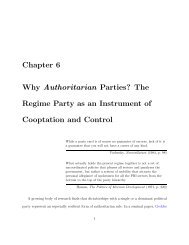Popkin-Reasoning Voter-Ch 3.pdf
Popkin-Reasoning Voter-Ch 3.pdf
Popkin-Reasoning Voter-Ch 3.pdf
Create successful ePaper yourself
Turn your PDF publications into a flip-book with our unique Google optimized e-Paper software.
48 <strong>Ch</strong>apter Three<br />
sion news provides commentary on speeches, proposals, and crises from<br />
a variety of well-known political figures from whom voters can triangulate,<br />
just as they do with local opinion leaders. The late Claude<br />
Pepper, for example, was known to senior citizens ('At my age,I don't<br />
even buy green bananas") for his defenses of Social Security, and was<br />
always asked to comment on new Social Security Insurance proposals. No<br />
coverage of an intemational crisis is complete without comments from<br />
Henry Kissinger and Senator Sam Nunn. Such figures become well known<br />
over time; their comments allow voters to mediate new information<br />
and watch for "fire alarms" through the media as well as through conversation.<br />
Richard Brody has studied the effect on viewers of elite interpretationpf<br />
political events.12 Brody studied events that gave large short-term boosts<br />
to the president's popularity. Sometimes a large gain in presidential popularity<br />
appears to deff explanation. For example, the U.S.-backed invasion<br />
of Cuba in 196l led to an ignominious defeat at the Bay of Pigs, but President<br />
Kennedy's popularity soared after the debacle, for which he took full<br />
responsibility. Brody has shown that seemingly incongruous situations<br />
like this, when a president's popularity soars after a humiliating fiasco, can<br />
be explained by the response of elite figures to the event, as featured in the<br />
media. If there is a crisis and the elite figures rally to support the president,<br />
then the president's popularity soars, fiasco or not. If the elites are divided<br />
and critical, as after the Tet Offensive in Vietnam, the president's popularity<br />
can plummet, as it did for Lyndon Johnson.<br />
T\,vo kinds of campaign situations wherein television coverage after an<br />
event can determine the extent of mass reaction are similar to those Brody<br />
has analyzed: (l ) situations wherein challengers present their positions on<br />
issues, and (2) situations wherein ambiguous, possibly innocuous, remarks<br />
are made. When a challenger, in an attempt to demonstrate credibility<br />
and competence, releases details of his plans for defense or the budget<br />
(for example), public response depends not on an understanding of the details<br />
but on elite reaction as reported in the media. For example, in L972 the<br />
Democratic nominee for president, George McGovem, presented his tax<br />
and defense plans to the media in an attempt to demonstrate their feasibility.<br />
When cabinet member after cabinet member in the Nixon<br />
administration attacked the plans, and no major figures in the Democratic<br />
party-neither well-known senators nor former cabinet members-stood<br />
up to denounce the attacks as unfair or partisan, McGovern's credibility<br />
suffered. Likewise, when Ronald Reagan, campaigning for the Republican<br />
nomination in 1976, presented plans for cutting the federal budget by l0<br />
Going without Data 49<br />
p('rcent, and the details were attacked by many during the primaries and<br />
rlt'll'nded by none, there was a similar reaction. McGovern and Reagan had<br />
ttot organized enough elite support to counter the many cabinet members'<br />
irllacks on their proposals. They had to defend against the attacks personnlly,<br />
which eflectively precluded them from spending their precious airtime<br />
r tt t I he offensive. r 3 Of course, a president with little inlluence cannot mobilkc<br />
his office, and a challenger with elite support can fend oflthe attacks.<br />
Also, if the elites are discredited, it does not matter if the challenger cannot<br />
rnlly prominent members of the establishment to his side.<br />
When a candidate makes careless or poorly worded statements, the publk'<br />
rcaction often depends on whether news reports highlight these<br />
lrrrrrments as significant or pass them by. In 1976, in discussing ethnic<br />
ttelghborhoods in a newspaper interview in New York, presidential candirlntc<br />
Jimmy Carter used the curious phrase "ethnic purity." Until it was<br />
It'alttred on television several days later, there was no reaction to the<br />
plrr.rsc from voters or opposing politicians.ra After it was widely publlt'lzcd,<br />
Carter had to spend several weeks of the campaign rebuilding his<br />
lhrks to the black community.r5 Although some remarks are so revealing<br />
wltctt reported in the media that no elite mediation is necessary-such<br />
ar ,lcsse Jackson's reference in a personal conversation to New York City<br />
Ar "Hymieto147p"-11any statements do not register as significant to<br />
ttl(,st people unless they are aware of how others evaluate the remarks<br />
dr wcll. When citizens sample information about government, and<br />
llrlerr t











